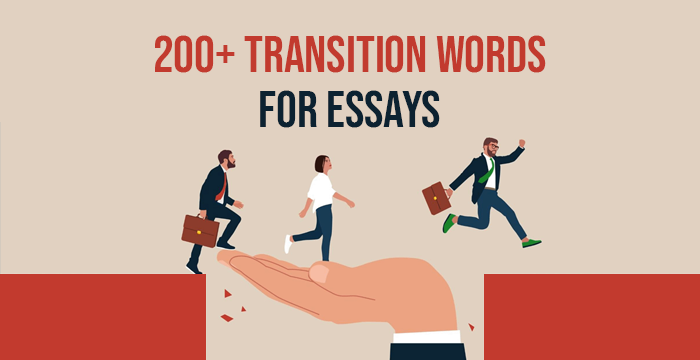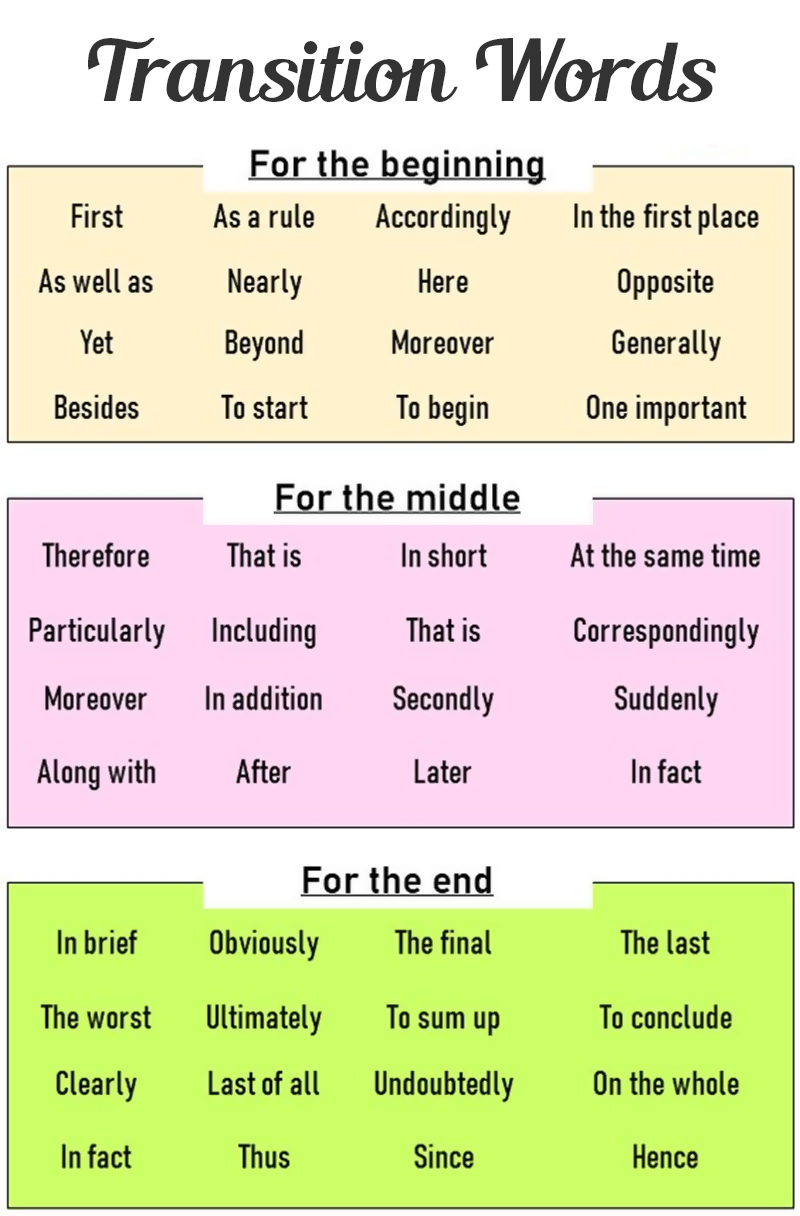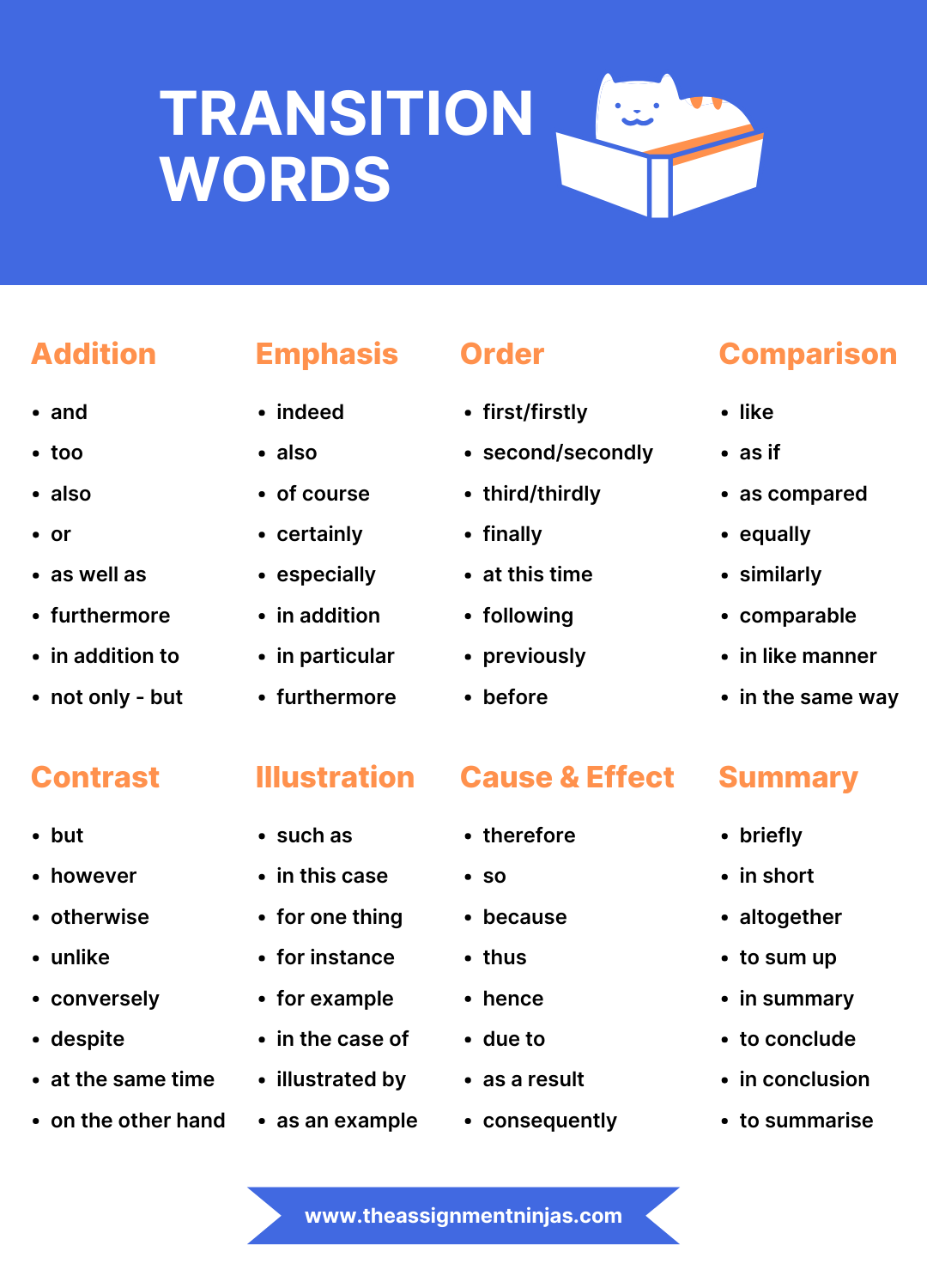
What are transition words?
Transition words are linking words that help collect different sentences and thoughts in an essay or writing. They provide a way to move from one idea to another, building relationships between other document parts. During the preparation of the report, to provide high-quality writing that can be quickly understood and read by the readers, the use of phrases and transition words becomes very necessary. They also help give an idea for the following information that may be presented in the article. The transition words should be used wisely, as they can make or break the flow of an entire essay.
Types of transition words:
Three transition words are used to draft an article or essay. The type of transition word depends on the complexity, kind of text and length of the word.

- Transition between two different sections: In the case of long documents and essays, the use of transition paragraphs helps in summarising a particular area of the paper to the readers. It also helps in linking the following information in the article. Some of these words are: In the following section, to develop more knowledge, etc.
- Transition between two different paragraphs: This type of transition word generally links two separate paragraphs in the essay. The transition helps summarise the information provided in the first paragraph and connect it with the data presented in the next section. Examples of this type of transition words are, in contrast, similarly, furthermore, and many more.
- Transition in the same paragraph: They help prepare the essay's readers for the following information they will receive. These are generally single-phrase transition words such as the in particular, for instance, moreover, however, and many more.
Different types of transition word:
The following table shows the different types of transition words and their benefits.
| Type | Example Words/Phrases | Function |
| Addition | Moreover, furthermore, Additionally, In addition to | Adds ideas or information |
| Contrast | On the other hand, However, In contrast, Conversely | Shows a contradiction or difference |
| Comparison | Likewise, In the same way, Similarly, Just as | Helps in creating similarity among the different ideas. |
| Cause and Effect | Consequently, As a result, Thus, Therefore | Provides a cause-and-effect relationship |
| Time/Sequence | Meanwhile, Subsequently, firstly | Provides ideas chronologically |
| Example/Illustration | For instance, For example, To illustrate, Specifically | Provides examples and illustrations |
| Emphasis | Without a doubt, Undoubtedly, indeed, and certainly | reinforces a particular idea or point |
| Summary | In conclusion, Overall, To summarise, All in all | Helps in summarising the main ideas and thoughts in the essay. |
| Clarification | That is to say, In other words, Specifically, namely | Help in providing further explanation and clarification. |
| Result | Accordingly, Hence, consequently, and thus. | Provides information regarding the outcome of the development of a previous action or statement |
Tips for using transition
- The transition words should be used at the start of the paragraph.
- To generate a relation between the evidence described in the essay and the result found in the writing.
- Use the end of each paragraph to provide the opening for the next section.
- Transition words should be used at the start of the introductory paragraph and summarise the ending of each section.
- Transition words can be used in the summary to conclude the entire work.
Things to remember while using transition words in an essay
- It is important to remember that the overuse of transition words can make them irrelevant in the essay. The excessive use of transition words can make the readers feel that they need to give the readers more chances to create a connection in the essay.
- It is also important to use the correct transition word in the essay. As the transition words connect the different paragraphs in the project, the use of the wrong transition word can make the entire essay unsuitable.
- Understanding which words can be used at the beginning of an essay is essential. Sometimes, transition words are used to begin a paragraph; however, they are very informal and should not be used in academic papers. For instance, starting a section with something other than and, because, or but in academic writing is better.
200 transitional words for essays:

Similarity
- In addition to
- As a matter of fact
- Moreover
- Similarly
- Furthermore
- Equally important
- Also
- In the same way
- Comparatively
- Correspondingly
- Again
- Not only… but also
- In like manner
- As well as
- Thus
Order or sequence
- Firstly… secondly… thirdly
- After
- Simultaneously
- Next… then… finally
- Later
- In the first place… in the second place
- Formerly… presently
- Since
- Once
- To begin with
- Sooner… later
- As soon as
- Shortly
- By the time
- Now that
Contradiction, opposition
- Despite
- While it may be true
- However
- On the one hand… on the other hand
- Nonetheless
- In contrast
- Notwithstanding
- On the contrary
- Nevertheless
- Yet
- Still
- As much as
- Although this may be true
- Even though
- Rather
Cause and effect
- As a result
- Consequently
- Thus
- Accordingly
- Therefore
- Hence
- So
- With this in mind
- Owing to
- since
- Due to
- To the end that
- To
- In light of
- While
Examples
- For example
- For instance
- Specifically
- Namely
- Of course
- Again
- Truly
- To illustrate
- To demonstrate
- As an example
- Especially
- Particularly
- Also
- Equally important
- Besides
Space, time, and location
- After
- Afterwards
- At last
- Meanwhile
- Then
- Subsequently
- Before
- Currently
- Simultaneously
- Nearby
- Adjacent
- Immediately after
- Back then
- Nowadays
Summary and conclusion
- In conclusion
- To sum up
- In summary
- Finally
- In a word
- Briefly
- In brief
- In the end
- To conclude
- To summarise
- On the whole
- In other words
- Altogether
- In short
- Ultimately


